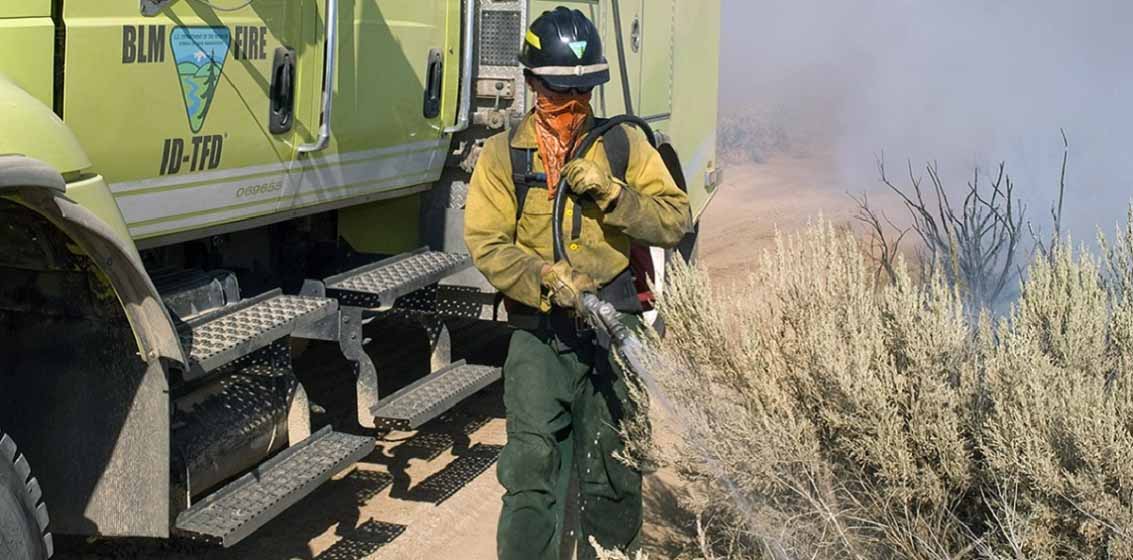
While taking active measures to protect the public and employees and minimize exposure to COVID-19, the Bureau of Land Management (BLM) continues to reduce hazardous fuels across the West and in Alaska and to plan for the upcoming fire season by maintaining and strengthening firefighting capabilities.
“We are committed to protecting our colleagues in the BLM and those with whom we come in contact during this challenging time; however, as westerners we know we must fight fire all year long and we will do exactly that,” said BLM Deputy Director for Policy and Programs William Perry Pendley. “Guided by the Center for Disease Control and Prevention as well as state and local health authorities, we continue to implement proactive COVID-19 measures to protect employees and the public, but, when it comes to fire, we have no intention of standing down.”
The BLM Fire and Aviation program works closely with, and relies on, its state and local partners for all wildfire suppression efforts. During the COVID-19 outbreak, some state governments have declared they will not permit state and local resources to respond to wildfires outside of their local jurisdiction, which will greatly limit the national response capabilities of these valuable resources. The BLM is working with these governments to address concerns and to ensure, to the greatest extent possible, that shared resources are available to be deployed wherever need may be greatest.
“In order to ensure smooth interstate wildfire suppression operations, all wildland firefighters must be permitted to cross state boundaries without restriction to ensure safe and effective wildfire operations throughout the country,” said Pendley. “We beseech our federal, state, and local partners to ensure that ability.”
Every year, the BLM works with its Federal, state, and local partners to conduct initial attack on all wildland fire incidents to suppress wildfires as soon as they ignite. Aggressive initial attack is the single most important method to ensure the safety of firefighters and the public; it also limits suppression costs. During the COVID-19 outbreak, the wildland fire agencies will continue to work to suppress wildfires with the goal of reducing wildfire size and intensity.
The BLM is also working with its Federal, state and local partners to develop specific COVID-19 wildfire response plans to provide for wildland fire personnel safety. These plans outline best management practices to limit the spread of the virus and to provide a safe working environment for all wildland fire personnel.
In addition to large air tankers and Type 1 and 2 helicopters under contract with the U.S. Forest Service, the BLM will have on contract 34 Single Engine Airtankers (SEAT), 4 water scooping air tankers, 7 smokejumper planes, 19 tactical support aircraft, and 25 helicopters for wildfire suppression efforts this year. The BLM also has access to call when needed helicopters, SEATs, Large and Very Large Airtankers, water scoopers, and tactical support aircraft.
-BLM

Why not use fs viper resources then?
What jurisdictions have enough local personnel to handle a large wildfire? None. This must be rectified before this spring, summer and fall season ignites. I understand, perhaps these jurisdictions don’t fully?
It’s easy to put your “plan” in place, and saying the borders of jurisdictions will be on lock-down. But when smoke is in the air, and that head fire is racing towards their community, I’d wager a bet the plan goes out the window.
I get it,it’s not good business to wait for that. But there’s all these grandiose planning documents flying around, preventing illness and exposure to firefighters. Great. But we all should remember that in our line of work, things change quickly, plans change quickly. This is no different. We will make an attempt to follow CDC guidelines when feasible, but at some point we need to do the job we were hired to do. Same as any other hazard out there.
Right, krs.